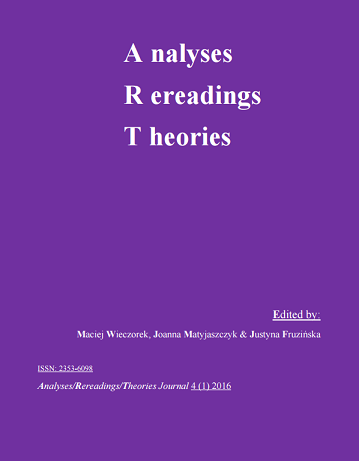Secularism and Its Discontents: The Moor’s Last Sigh and Riot
DOI:
https://doi.org/10.18778/2353-6098.4.01Keywords:
Secularism, Salman Rushdie, The Moor’s Last Sigh, Sashi Tharoor, State and ReligionAbstract
The recurrent theme of dropping frontiers in a world which has become increasingly heterogeneous but intolerant is the leitmotif of Sashi Tharoor’s Riot and Salman Rushdie’s The Moor’s Last Sigh. The figure of the Moor and his hybrid genealogy is central to Rushdie’s vision, as he reconstructs a syncretic, tolerant Moorish Spain and juxtaposes it with Bombay, his haven of pluralism. He celebrates Nehru’s vision of a new Indian nation which, in keeping with the traditions of western modernity, promised to be above religion, clan, and narrow parochial considerations. With the vanishing of such ideals and hopes, as boundaries and religious communalism are getting intensified these diasporic cosmopolitan writers make a case for a boundless world. Their response is a human subjectivity which transcends color, class, narrow parochialism, tribalism and fundamentalism. Secularism is the very base of their humane approach. This essay, therefore, analyzes the theme of secularism and its discontents, particularly in the context of the coexistence of Hindus and Muslims in India, as it runs through Rushdie’s The Moor’s Last Sigh and Tharoor’s Riot by exploring the various layers of allegories related to pluralism and the critique of fundamentalism in them. Toward this end, it will focus on the recent debates on Indian secularism by scholars to interrogate the relevance of the European model of secularism which argues for the separation of state and religion.
References
Bilgrami, Akeel. ―Secularism, Nationalism and Modernity.‖ Secularism and Its Critics. Ed. Rajeev Bhargava. New Delhi: Oxford U P, 2005. 380-417. Print.
Google Scholar
Chatterjee, Partha. ―Secularism and Toleration (1994).‖ Empire and Nation: Selected Essays. New York: Columbia U P, 2010. 203-35. Print.
Google Scholar
DOI: https://doi.org/10.7312/chat15220-014
Cossman, Brenda, and Ratna Kapur. Secularism’s Last Sigh: Hindutva and the (Mis)Rule of Law. New Delhi: Oxford U P, 1999. Print.
Google Scholar
Deshmukh, K.G. ―Common Affinities.‖ Secularism in India – A Challenge. Ed. Radhey Mohan. New Delhi: Dr. Zakir Husain Educational & Cultural Foundation, 1990. 65-74. Print.
Google Scholar
Madan, T.N. ―Secularism in Its Place‖ Secularism and Its Critics. Ed. Rajeev Bhargava. New Delhi: Oxford U P, 1998. 297-321. Print.
Google Scholar
Nandy, Ashis. ―The Politics of Secularism and the Recovery of Religious Toleration.‖ Secularism and Its Critics. Ed. Rajeev Bhargava New Delhi: Oxford U P, 1998. 321-45. Print.
Google Scholar
Rushdie, Salman. Step Across This Line. New York: Random House, 2002. Print.
Google Scholar
Rushdie, Salman. The Moor’s Last Sigh. New York: Vintage, 1997. Print.
Google Scholar
Sen, Amartya. ―Secularism and Its Discontents.‖ Secularism and Its Critics. Ed. Rajeev Bhargava. New Delhi: Oxford U P, 1998. 454-86. Print.
Google Scholar
Sunder Rajan, Rajeswari. ―Women Between Community and State: Some Implications of the Uniform Civil Code Debates In India.‖ The Scandal of the State: Women, Law and Citizenship in Postcolonial India. Durham: Duke U P, 2003. 147-73. Print.
Google Scholar
DOI: https://doi.org/10.1215/9780822384830-005
Tharoor, Shashi. Riot. New York: Arcade, 2001. Print.
Google Scholar
Downloads
Published
How to Cite
Issue
Section
License

This work is licensed under a Creative Commons Attribution-NonCommercial-NoDerivatives 3.0 Unported License.









